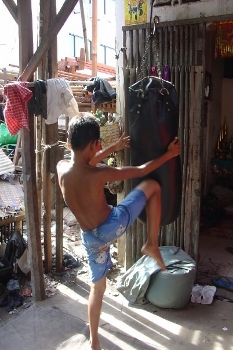When I told Eh Phou Thoung how famous he is on the internet and what a great hero he is to overseas Khmers, he didn’t believe me.
The only time I saw Eh Phou Thoung is when he was training his five year old son. The little boy works the bag with his legs, throwing tiny little knee kicks. When he punches the bag, he shakes the pain out of his hands. He is cute, and with Eh for a father, he will be a great fighter. But for what? There is no future for boxers in Cambodia, which is a sad realization because boxing is the national sport.
“I am fighting tomorrow,” he says, out of the blue. It was a charity event, sponsored by Wild Aid, to raise awareness and protect endangered species.
“Oed is fighting in Australia.” He was referring to his younger brother Oed Phou Thoung, who is a brilliant fighter in his own right. “He’s coming home tomorrow.”
The next day, I stopped by the house to talk to the 26 year old Oed Phou Thoung, the four time champion at 67 kg. Oed has had over 200 fights since he was ten years old. When I asked him how he got permission to go fight in Australia, he laughed.
“I didn’t tell anyone. I just went.”
According to Oed, in Australia a lot of people were waiting for him to fight, but the fight had been cancelled twice, by the power people in Cambodia. As a result, ticket sales were poor for this fight, since people didn’t believe it was going to happen.
Although Oed helps train the fighters at Eh Phou Thoung’s gym, his brother is not his manager. His contract is held by someone else, and he is only permitted to fight on TV 5. He is also not permitted to fight or leave the country without permission.
In Australia Oed Phou Thoung won his bout and earned a purse of $500 Australian after deductions for passport and visa. “But this is good compared to Cambodia,” he assured me. “In Cambodia , when I fight a foreigner, I gets $300. If I fight a Khmer, I only get $150.”
He said the hardest thing about the Australia fight was fatigue, as he arrived and fought the very next day.
“In Cambodia I can only fight about once every three months. So, the money is very little.”
“The problem is when the sponsors send money from abroad it doesn’t reach me.” It only reaches the boss. “That’s why we only have two boxing sacks to train twenty fighters.”
Oed said that in a perfect world he would get to fight and then rest two or three days before fighting again. I told him that in other countries, fighters only fought once every few months. I asked if he had heard of Muhammad Ali. He said that he had. He was shocked when I told him that Muhammad Ali had only about 55 fights in his life. Oed had had more than that by his 18th birthday. And his combined earnings for his entire career probably amounted to only a few thousand dollars.
To make ends meet, Oed worked as part of the crew at TV 5, helping the doctor with injured fighters.
“One boxer, Phin Sophal, committed suicide,” said Oed, sadly. “He had been very famous, with a lot of fights. He drank and took drugs, then cut his own throat. They took him to the hospital and the doctors saved him. But the wound reopened and he died.”
Things are hard for fighters everywhere. And the ring is full of sad stories. But the hopeless situation facing Khmer boxers is unparalleled in any other country.
Oed got up and worked the bag: pow, pow, pow, slap, slap, bang. The whole house shook as his knee left deep dents in its surface. His knees were clearly as well developed as his shins. Every muscle in his body was absolutely taught, perfectly trained.
Unlike his brother, Oed was still training. He had a glimmer of hope in his eye. Maybe his unauthorized trip to fight in Australia set a precedent. Maybe he would take control of his life and make some serious money. Or, maybe at age 26, his prime was past, and he was doing too little too late. Maybe he would manage Eh Phou Thoung’s young son, and help raise him to be a champion on the international circuit.
Either way, Cambodian had missed a great PR opportunity and had squandered a national treasure.







